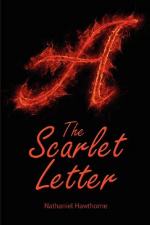Much of the marble coldness of Hester’s impression was to be attributed to the circumstance that her life had turned, in a great measure, from passion and feeling to thought. Standing alone in the world—alone, as to any dependence on society, and with little Pearl to be guided and protected—alone, and hopeless of retrieving her position, even had she not scorned to consider it desirable—she cast away the fragment of a broken chain. The world’s law was no law for her mind. It was an age in which the human intellect, newly emancipated, had taken a more active and a wider range than for many centuries before. Men of the sword had overthrown nobles and kings. Men bolder than these had overthrown and rearranged—not actually, but within the sphere of theory, which was their most real abode—the whole system of ancient prejudice, wherewith was linked much of ancient principle. Hester Prynne imbibed this spirit. She assumed a freedom of speculation, then common enough on the other side of the Atlantic, but which our forefathers, had they known it, would have held to be a deadlier crime than that stigmatised by the scarlet letter. In her lonesome cottage, by the seashore, thoughts visited her such as dared to enter no other dwelling in New England; shadowy guests, that would have been as perilous as demons to their entertainer, could they have been seen so much as knocking at her door.
It is remarkable that persons who speculate the most boldly often conform with the most perfect quietude to the external regulations of society. The thought suffices them, without investing itself in the flesh and blood of action. So it seemed to be with Hester. Yet, had little Pearl never come to her from the spiritual world, it might have been far otherwise. Then she might have come down to us in history, hand in hand with Ann Hutchinson, as the foundress of a religious sect. She might, in one of her phases, have been a prophetess. She might, and not improbably would, have suffered death from the stern tribunals of the period, for attempting to undermine the foundations of the Puritan establishment. But, in the education of her child, the mother’s enthusiasm of thought had something to wreak itself upon. Providence, in the person




